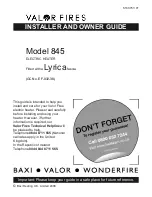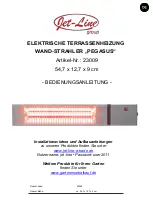
WARNING
mrcool.com
26
Connecting a Pressure Relief Valve
• To avoid potential property damage or personal injury, check the pressure relief valve at least
once every three years by manually operating the valve to ensure proper operation.
• Before manually operating the valve, check the discharge line and make sure that the hot
discharge water will not cause personal injury or property damages. Contact with the discharge
water may result in severe personal injury.
10
11
Improper installation of the pressure relief valve may result in property damage, personal injury,
or death. Follow all instructions and guidelines when installing the pressure relief valve.
• The valve should ONLY be installed by a licensed professional.
• To avoid water damage or scalding, direct the discharge line to a safe place for disposal.
Connecting a Pressure Relief Valve
To complete the installation of the water heater, you must install an approved 3/4 in,
maximum 150 PSI pressure relief valve on the hot water outlet. The water heater has a
built-in, high temperature shut-off switch, so install a “pressure only” relief valve. This valve is not supplied, but
is required. The pressure relief valve should be placed as close to the water heater as possible. No other valve
should be placed between the pressure relief valve and the water heater.
Figure 10.1
on the previous pages
represents a typical water heater with a pressure relief valve.
When installing the pressure relief valve, follow these guidelines:
DO NOT
plug the relief valve. If the relief valve discharges periodically, this may be due to
thermal expansion in a closed water supply system. Contact the water supplier or local plumbing
inspector on how to correct this situation.
DO NOT
direct the discharge line to a location where freezing could occur.
DO NOT
install a reducing coupling or other restriction on the discharge line.
Ensure that the discharge capacity of the pressure relief valve is equal to or greater than the
maximum pressure rating of the water heater.
Ensure that the maximum BTU/H rating on the pressure relief valve is equal to or greater than
the maximum input BTU/H rating of the water heater.
Direct the discharge piping of the pressure relief valve so that hot water will not splash on
anyone or any nearby equipment.
Attach the discharge line to the pressure relief valve and run the end of the line to within 6-12 in.
(150-300 mm) of the floor drain, making discharge clearly visible.
Ensure that the discharge line will allow free and complete drainage without restriction.
Ensure that the discharge line is not plugged or obstructed.
After filling and pressurizing the system, test the relief valve operation by lifting the lever. If the
valve fails to operate correctly, immediately replace the relief valve.
•
•
•
•
•
•
•
















































